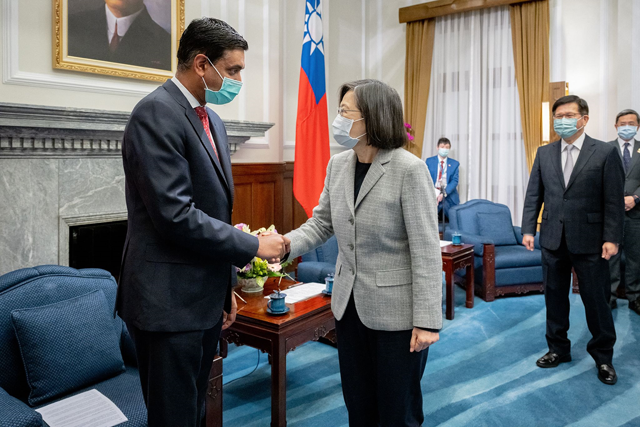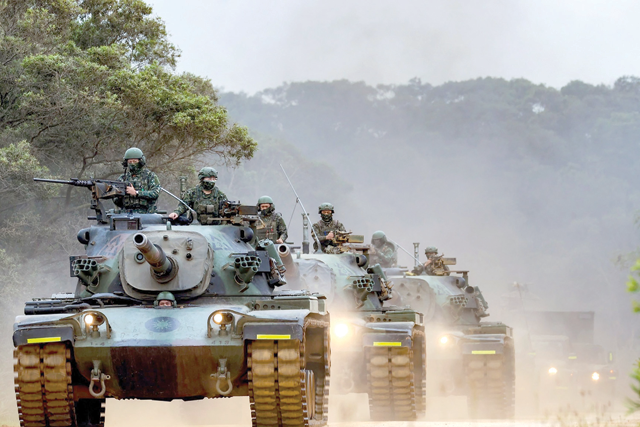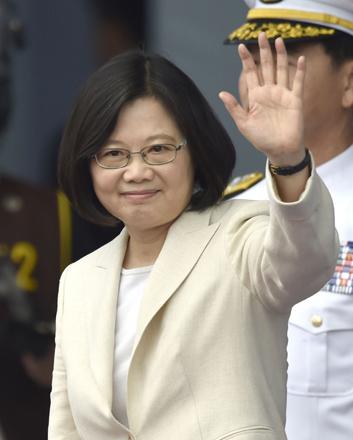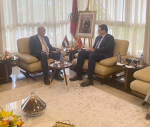You are here
Taiwan 'to bolster' military ties with United States
By AFP - Feb 21,2023 - Last updated at Feb 21,2023

This handout photo taken and released by Taiwan Presidential Office on Tuesday shows Taiwan President Tsai Ing-wen (centre) shaking hands with US Representative Ro Khanna at the Presidential Office in Taipei (AFP photo/Taiwan Presidential Office)
TAIPEI — Taiwan will boost military exchanges with the United States to curb "authoritarian expansionism", President Tsai Ing-wen said Tuesday after meeting with visiting US lawmakers.
The five-day US congressional visit comes after a top US defence official reportedly made a rare stopover to the self-ruled island while Washington-Beijing tensions flared over alleged Chinese spy balloons.
“Taiwan and the United States continue to bolster military exchanges,” Tsai said after convening with the US delegation at her office in Taipei.
“Going forward, Taiwan will cooperate even more actively with the United States and other democratic partners to confront such global challenges as authoritarian expansionism and climate change.”
Tsai did not provide further details on what the future exchanges might entail.
Washington diplomatically recognises Beijing over Taipei, but is also the self-governing island’s most important international benefactor and supports Taipei’s right to decide its future.
Beijing, which claims Taiwan as part of its territory and has vowed to seize it one day, opposes any official exchanges with the democracy and has reacted with anger to a flurry of trips to the island by US politicians in recent years.
Chinese foreign ministry spokesman Wang Wenbin on Tuesday accused Taiwanese leaders of “provocation”, warning that “any futile separatist conspiracy or scheme relying on foreign forces to undermine cross-strait relations will only backfire and never succeed”.
Taiwan authorities “cannot change the inevitable broader trend towards Chinese unification”, Wang said at a regular press conference.
In Taipei, Tsai said it was time “to explore even more opportunities for cooperation” between the United States and Taiwan.
“Together we can continue to safeguard the values of democracy and freedom,” she said.
Diplomacy, defence and semiconductors
Relations between Beijing and Washington have grown increasingly tense, and China responded angrily to a Financial Times report about a weekend visit by Michael Chase, the deputy assistant US secretary of defence for China.
The British newspaper said Chase was the most senior Pentagon official to visit the island since 2019.
In Taipei, California representative Ro Khanna, a member of a newly created US House committee on strategic competition with China’s Communist Party, said he was leading the bi-partisan delegation’s visit to expand “the partnership on military and defence” and to shore up ties with the island’s world-leading semiconductor industry.
“We are here to affirm the shared values between the United States and Taiwan, a commitment to democracy, a commitment to freedom,” he said on Tuesday.
Khanna added that he “particularly appreciated” a meeting with Morris Chang, founder of Taiwan Semiconductor Manufacturing Company (TSMC), which is the world’s largest contract chipmaker.
The global semiconductor industry has been upended by an ongoing economic slowdown dampening demand as well as by a raft of US export controls aimed at preventing China from obtaining advanced chips.
Cross-strait exchanges
Relations between the world’s two largest economies dipped to a low point in August as China staged war games near Taiwan following a visit by Nancy Pelosi, then speaker of the US House of Representatives.
Both sides recently signalled hopes for a reset, but at a weekend meeting with US chief diplomat Antony Blinken, China’s foreign minister Wang Yi accused Washington of harbouring a “misguided” perception of Beijing.
Blinken has previously warned that China may be stepping up its time frame for a possible invasion of Taiwan.
Recently, Beijing has taken steps to court Taiwan’s pro-China opposition through cross-strait exchanges ahead of the island’s 2024 presidential race.
Earlier this week, the first official Chinese delegation to visit the island since the pandemic met with the opposition-led Taipei city government, just as Kuomintang party leaders returned from their own trip to the mainland.
Related Articles
PINGTAN, China — China declared it had "successfully completed" three days of war games around Taiwan on Monday, after it deployed dozens of
TAIPEI — Taiwan’s new president, Tsai Ing-wen, was sworn in on Friday, pledging to focus on internal reforms and expressing willingness to “
China and Taiwan on Tuesday held their first government-to-government talks since they split 65 years ago after a brutal civil war — a symbolic yet historic move between the former bitter rivals.

















